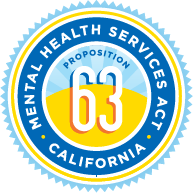Mental Health Services Act (MHSA) Update
Prop 63
Prevention and Early Intervention – Age 0-25 Task Force
A task force of providers, community based agencies, clients and community members convened over three 2-hour periods with the goal of developing recommendations for prevention and early intervention programming for children, youth, and transitional age youth. Participants prioritized strategies across various issues, including youth mental health crisis support and prevention, juvenile justice involved transition-age youth, early identification and treatment for children ages 5 and under, school and community connectedness, and substance use/mental health evidence-based programs for youth.
The prioritized recommendation moving forward for funding is to expand youth mobile mental health crisis support during school hours and after school in the community and include evidence-based prevention efforts such as training of youth, parents and school staff on identifying signs of mental illness, reducing stigma and supporting youth mental health and knowledge of available local resources (e.g. Question, Persuade and Refer training).
Parents, youth, clients/consumers and families, and task force participants discussed implementation considerations as follows:
- Include support services for peers and parents (those around the youth in crisis who will continue to support them post intervention).
- Prevention: include parental education, including parents of returning young veterans, address barriers for ethnic minorities and immigrants, and consider younger children (3-4 year olds).
- Partner with private insurance companies.
- Embed family partners in the mobile team.
To learn more about the task force activities, strategy development and prioritization, or to view meeting materials, see the MHSA website. Next steps include a short presentation to the Mental Health and Substance Abuse Recovery Commission on January 3, where the commission will vote to open a 30-day public comment period. You are welcome to submit your comments to mhsa@smcgov.org.
New MHSA Housing Units Awarded
The MHSA Housing Program was established to create permanent supportive housing for individuals with serious mental illness who are homeless or at risk of homelessness, and are enrolled in Full Service Partnerships, receiving wraparound services and supports. Since 2006, the funding has supported 50 housing units across four housing developments in Redwood City, South San Francisco, San Mateo and North Fair Oaks community.
Most recently, BHRS contributed the last of the MHSA Housing dollars, about $1.1 million, to the Affordable Housing Fund administered by the Department of Housing for the development of affordable housing, which led to 12 additional MHSA units expected in 2018 as listed below.
|
Year |
Housing Development and Location |
Units |
|
2009 |
Cedar Street Apartments 104 Cedar St., Redwood City |
5 MHSA units 14 total units |
|
2010 |
El Camino Apartments 636 El Camino Real, South San Francisco |
20 MHSA units 106 total units |
|
2011 |
Delaware Pacific Apartments 1990 S. Delaware St., San Mateo |
10 MHSA units 60 total units |
|
2017 |
Waverly Place Apartments 105 Fifth Ave, Redwood City |
15 MHSA units 16 total units |
|
Expected 2018 |
Bradford Senior Housing 707‐777 Bradford Street, Redwood City |
6 MHSA units 177 total units |
|
Expected 2018 |
2821 El Camino Real, Redwood City |
6 MHSA units 67 total units |
|
|
|
62 MHSA units |
